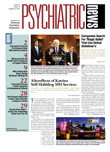A bill before Congress aims to improve the mental health of older Americans through better coordination and training of primary care physicians to diagnose mental illness and reduce record suicide rates among this population.
The bill, the Positive Aging Act of 2009 (HR 3191), was introduced by Rep. Patrick Kennedy (D-R.I.) in July to spur the use of improved psychiatric screening and diagnostic tools by primary care physicians and improve the training of those clinicians in identifying mental disorders in their geriatric patients. The measure also would encourage increased collaboration with mental health professionals on site in primary care settings that serve low-income seniors.
“The disconnect between primary care and mental health care means that older adults seen by their primary care physicians are too often misdiagnosed or improperly treated, and they continue to suffer from depression and other mental illnesses that complicate their medical conditions and lead to excess physical disability,” said Charles Reynolds III, M.D., president of the American Association for Geriatric Psychiatry (AAGP), in a written statement.
The legislation, which is supported by APA and allied mental health groups, targets that disconnect by authorizing funding for Medicare pilot programs that offer mental health screenings, referrals for follow-up care and consultations, and the provision of the leading “evidence-based protocols” for treating common mental health disorders. Grants would fund community-based mental health treatment outreach teams to provide services in primary health care facilities where many older Americans receive medical treatment.
Kennedy said that mental health screenings and preventive care are critical to seniors' overall health. The need for the legislation is highlighted by studies suggesting that 20 percent of elderly Americans experience a mental disorder at any given time, but more than 50 percent of those cases go untreated.
“An even bigger problem is that there are effective treatments for the disorders, but our system does a poor job of integrating these much-needed services,” said Rep. Ileana Ros-Lehtinen (R-Fla.), a cosponsor of the bill.
Other data that demonstrate the need for increased mental health care for this population include findings that men aged 85 and older have the highest rate of suicide in the nation, and untreated depression is the leading risk factor in such deaths, Reynolds said.
“It's tragic that one-third of older adults who commit suicide have seen their primary care physician in the week before completing suicide, and 70 percent have seen their doctors within the prior month,” Reynolds said.
These are among other provisions of the legislation:
•
Establish a deputy director for older adult mental health services in the Center for Mental Health Services (CMHS).
•
Include representatives of the elderly and geriatric mental health professionals on an advisory council at CMHS.
•
Include efforts to target substance abuse in older adults among the priority funding projects for the federal government.
•
Require states that receive mental health block grants to detail their mental health outreach and services for older citizens.
The AAGP has called on its members and other mental health advocates to contact their legislators and urge them to include the provisions of the bill in health care reform legislation.
The legislation was originally introduced in 2002 after Kennedy consulted with the AAGP and other mental health advocates on changes needed to improve the care that seniors receive for psychiatric illness.
The text of the Positive Aging Act of 2009 can be accessed at<http://thomas.loc.gov> by searching on the bill number, HR 3191. ▪
